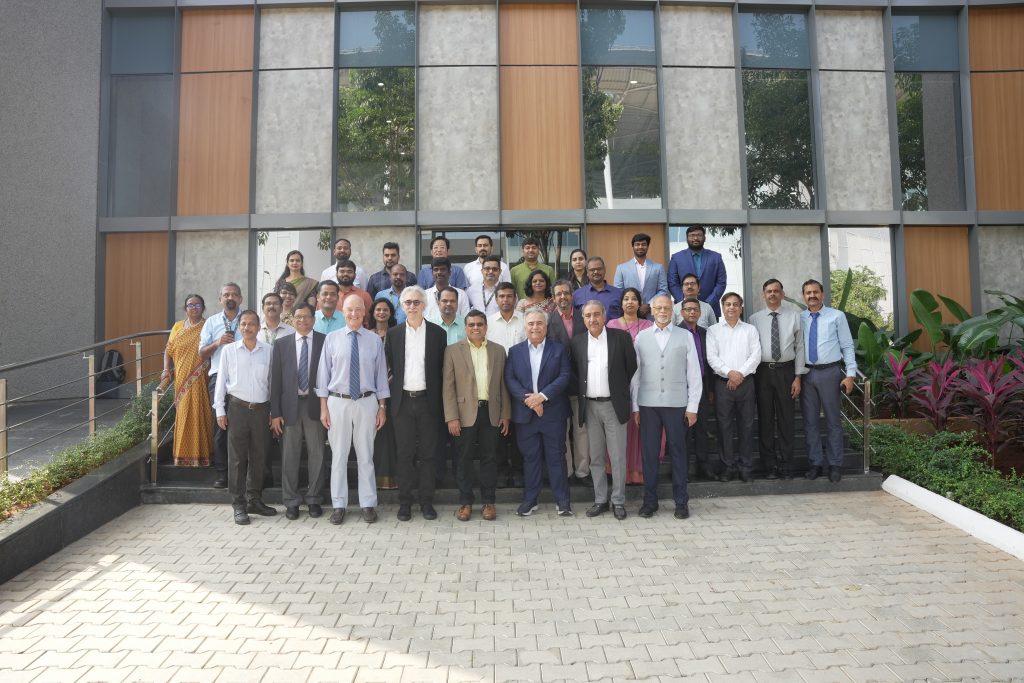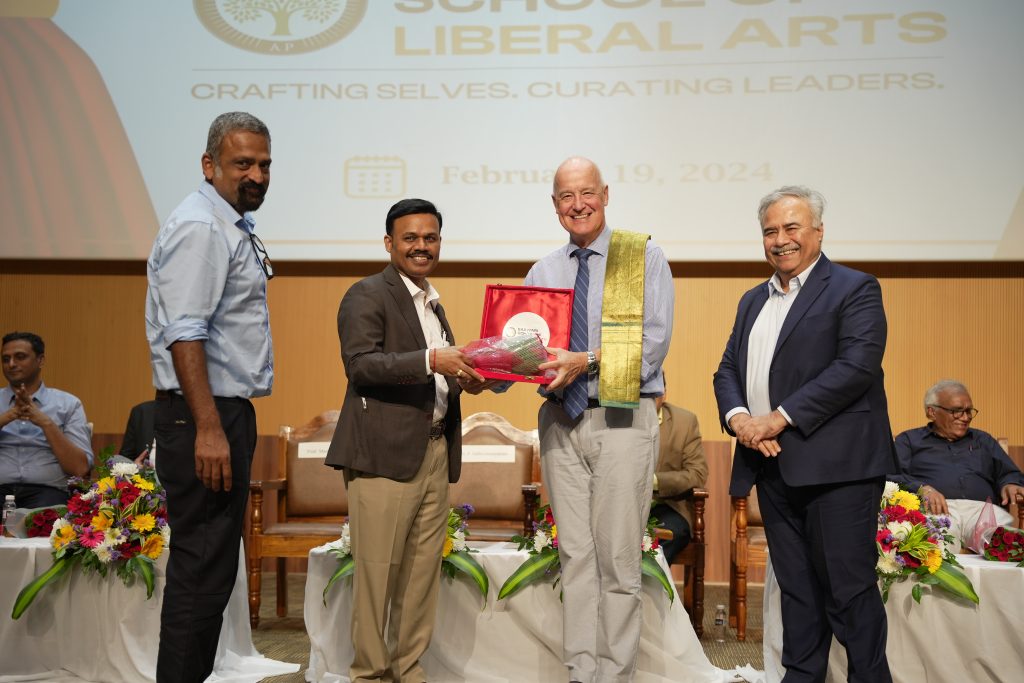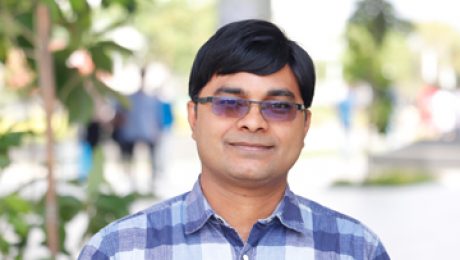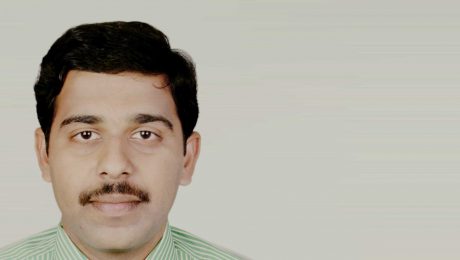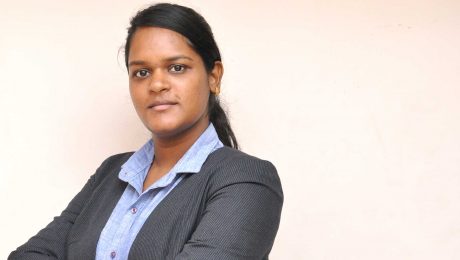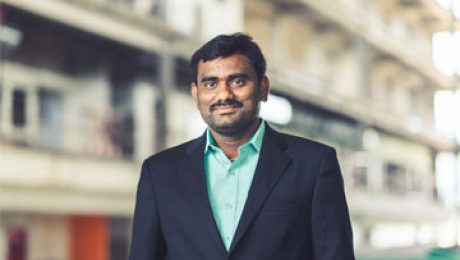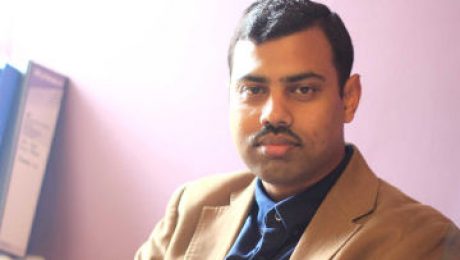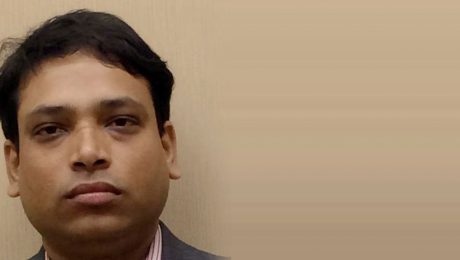A Thought-Provoking Session with Megha Thapar
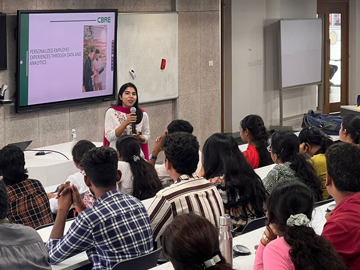 The Management precinct of the Paari School of Business had the honour of hosting an engrossing guest lecture, graced by Ms Megha Thapar, a distinguished Senior Associate Director – DEI. With an extensive 15-year career that spans the Financial Services, Retail, and Real Estate industries, Ms Thapar is renowned for her expertise in Diversity, Equity, and Inclusion (DEI). She brought invaluable insights and experiences to the forefront of this lecture, titled “Personalised Employee Experiences through Data and Analysis,” on August 21, 2024.
The Management precinct of the Paari School of Business had the honour of hosting an engrossing guest lecture, graced by Ms Megha Thapar, a distinguished Senior Associate Director – DEI. With an extensive 15-year career that spans the Financial Services, Retail, and Real Estate industries, Ms Thapar is renowned for her expertise in Diversity, Equity, and Inclusion (DEI). She brought invaluable insights and experiences to the forefront of this lecture, titled “Personalised Employee Experiences through Data and Analysis,” on August 21, 2024.
The primary goal of this session was to enlighten both management students and professionals on the transformative power of data and analytics in crafting personalised employee experiences. Emphasising the critical role of DEI in the workplace, the lecture aimed to showcase how organisations could utilise data to foster more inclusive and high-performing environments. This focus was rooted in the belief that understanding and leveraging data can lead to more equitable and effective organisational practices.
Throughout the event, attendees were engaged with a series of case studies, demonstrating the practical application of data in addressing real-world HR challenges. These included analysing and interpreting key metrics to create significant business impacts. Ms Thapar guided the audience through the intricacies of identifying actionable data, extracting meaningful insights, and implementing strategies that not only enhance employee satisfaction but also bolster organisational efficiency.
The session was instrumental in equipping participants with the critical thinking skills necessary for making informed, data-driven decisions. By delving deep into how data and analytics can revolutionise the employee experience, the lecture illuminated the pathways to advancing DEI initiatives within various organisational settings. Attendees were encouraged to apply the knowledge gleaned from the case studies shared by Ms Thapar, thereby learning to employ data-driven strategies in nurturing an inclusive workplace culture, boosting employee engagement, and aligning with broader organisational objectives.
As the lecture concluded, the outcomes were profoundly impactful. Participants left with a deeper understanding of the role of data in transforming employee experiences and driving DEI efforts. They gained practical knowledge on leveraging data to tackle real-world HR and DEI challenges effectively. Furthermore, the insights into interpreting data, understanding employee behavior, and identifying actionable insights empowered them to initiate meaningful changes within their organisations. Armed with these skills, they are now better positioned to weave DEI principles into their organisational fabric, using data to tailor solutions and foster a more inclusive, equitable work environment. This event not only highlighted the critical importance of analytics in creating dynamic, authentic, and diverse teams but also fostered a greater appreciation for the strategic use of data in achieving high-performance organisational outcomes.
- Published in Departmental News, News, Paari Current Happenings, SEAMS
Shaping an Academic Scholarly Milieu: Grand Launch of Easwari School of Liberal Arts
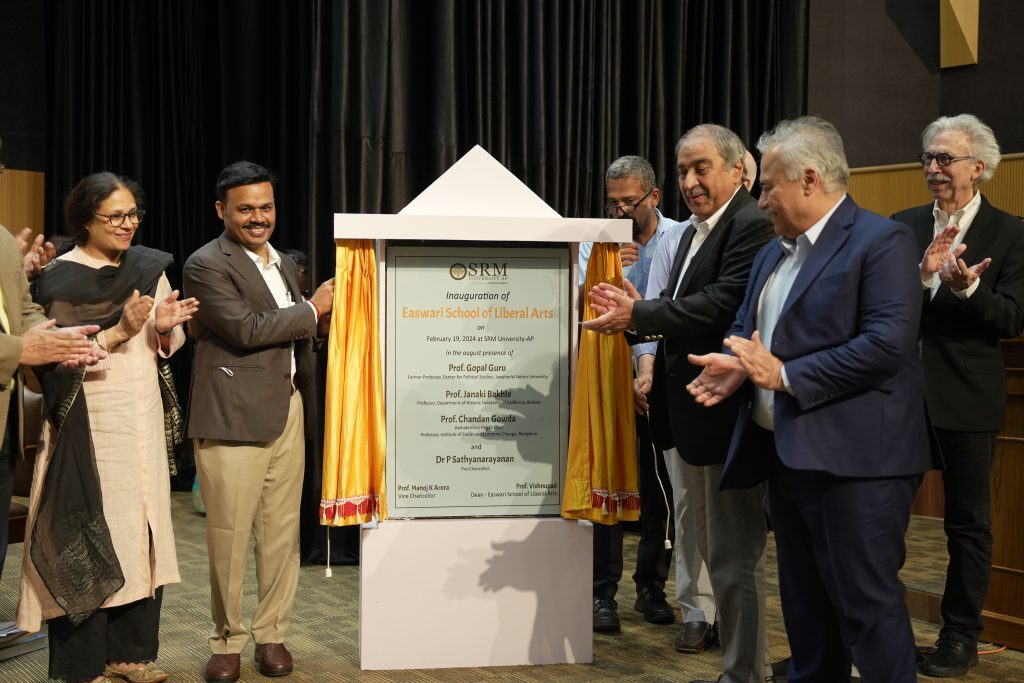
SRM University-AP relaunched the School of Liberal Arts and Social Sciences as the Easwari School of Liberal Arts, establishing a new era of transformative learning and research to address the complexities of human society. The school was inaugurated in the august presence of Pro-Chancellor Dr P Sathyanarayanan; Vice Chancellor Prof. Manoj K Arora; Members of the Governing Body – Prof. Pradeep Khosla, Chancellor, University of California, San Diego, Prof. Nicholas B Dirks, Emeritus Chancellor, University of California, Berkeley, Prof. Prasant Mohapatra, Vice Chancellor for Research and Provost and Vice President for Academic Affairs, University of South Florida, and Prof. Andrew D Hamilton, President, New York University; Dean – Easwari School of Liberal Arts, Prof. Vishnupad; Deans and Directors of various departments and faculty, staff and students of the university. Prof. Gopal Guru, Former Professor, Center for Political Studies, JNU; Prof. Janaki Bakhle, Associate Professor at the University of California, Berkeley; and Prof. Chandan Gowda, Ramakrishna Hegde Chair Professor, Institute of Social and Economic Change, Bengaluru, graced the momentous occasion as Guests of Honour.
The rechristened Easwari School of Liberal Arts aims to propel students’ intellectual, emotional and ethical growth, equipping them to become future knowledge creators. “The launch of Easwari School of Liberal Arts is a testament to the university’s commitment to interdisciplinary learning and research. Through a sound liberal arts education, we aim to cultivate diversified skills among our students,” remarked Vice Chancellor Prof. Manoj K Arora in his address. Prof. Vishnupad, Dean – Easwari School of Liberal Arts, further expounded on the symbolic renaming of the school and its established imperative to foster a three-fold growth in students – emotional, ethical and intellectual.
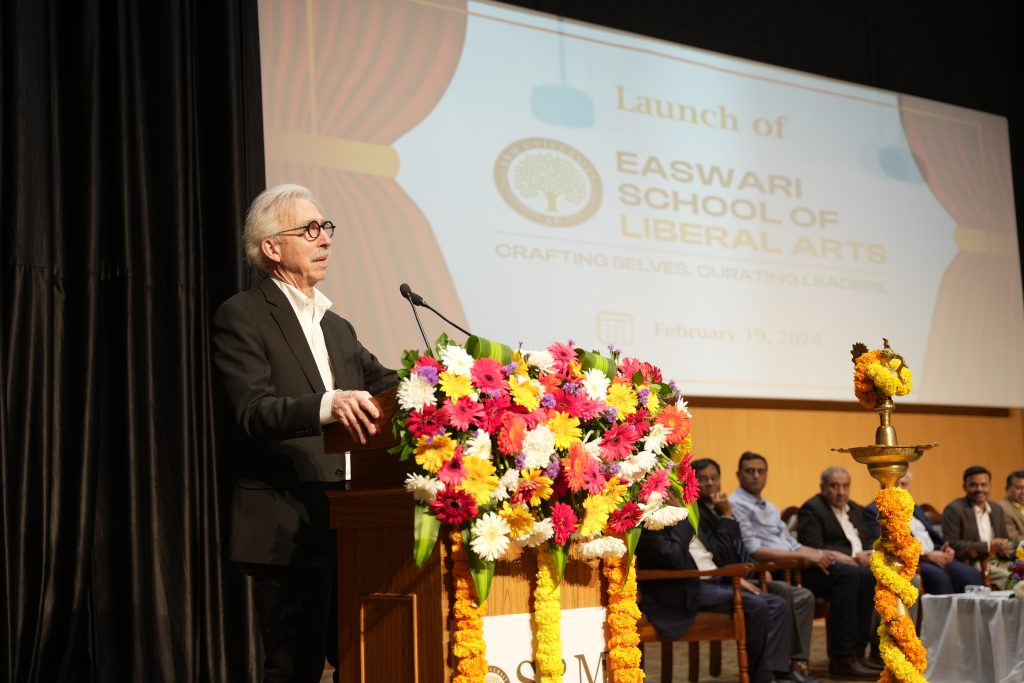
Pro-Chancellor, Dr P Sathyanarayanan commented that Easwari School of Liberal Arts opens the doorway to a brave new world of learning that will forge visionary thinkers. The School advocates breaking the academic silos of disciplines and offering students a more comprehensive integrated learning experience. In his address, Prof. Nicholas Dirks, Honourary Pro-Chancellor and a Governing Body member of SRM AP, stated, “Liberal Arts is a constitutive element of comprehensive education. SRM University-AP, with the launch of a dedicated School of Liberal Arts, is on its path to develop into an excellent comprehensive institute of higher education.”
The grand launch also witnessed a keynote speech by Guest of Honour, Prof. Gopal Guru, on the significance of liberal arts education in comprehending, analysing and solving the complexities of postmodern society. Insightful and inspiring book discussions on the books “Savarkar and the Making of Hindutva”, authored by Prof. Janaki Bakhle and “Another India: Events, Memories, People”, by Prof. Chandan Gowda, offering critical insights into the raw sentimentality of Indian society were highlights of the event.
The Easwari School of Liberal Arts harbours a robust, socially relevant, innovative curriculum, a distinguished and committed faculty, and imaginative and engaged teaching and learning methods to cultivate a class of motivated student ambassadors of tomorrow. In addition to offering traditional programmes such as B.A/B.Sc.(Hons.) in English, Economics, History, Psychology and B.Com in International Accounting; the School has also launched three pioneering programmes, namely, B.A. (Hons.) in Politics, Media Studies and Sociology and Anthropology, to equip students on how to address the socio-political, cultural and economic outlook of today’s society. With a novel pedagogy, these innovative programmes nurture logical reasoning, dynamic perspectives, rigour in thought and ideas, and critical reflection among students.
- Published in News, SLASS, University Event
Dr Ghanshyam Pandey Invited as Guest Speaker at BITS Pilani, Goa
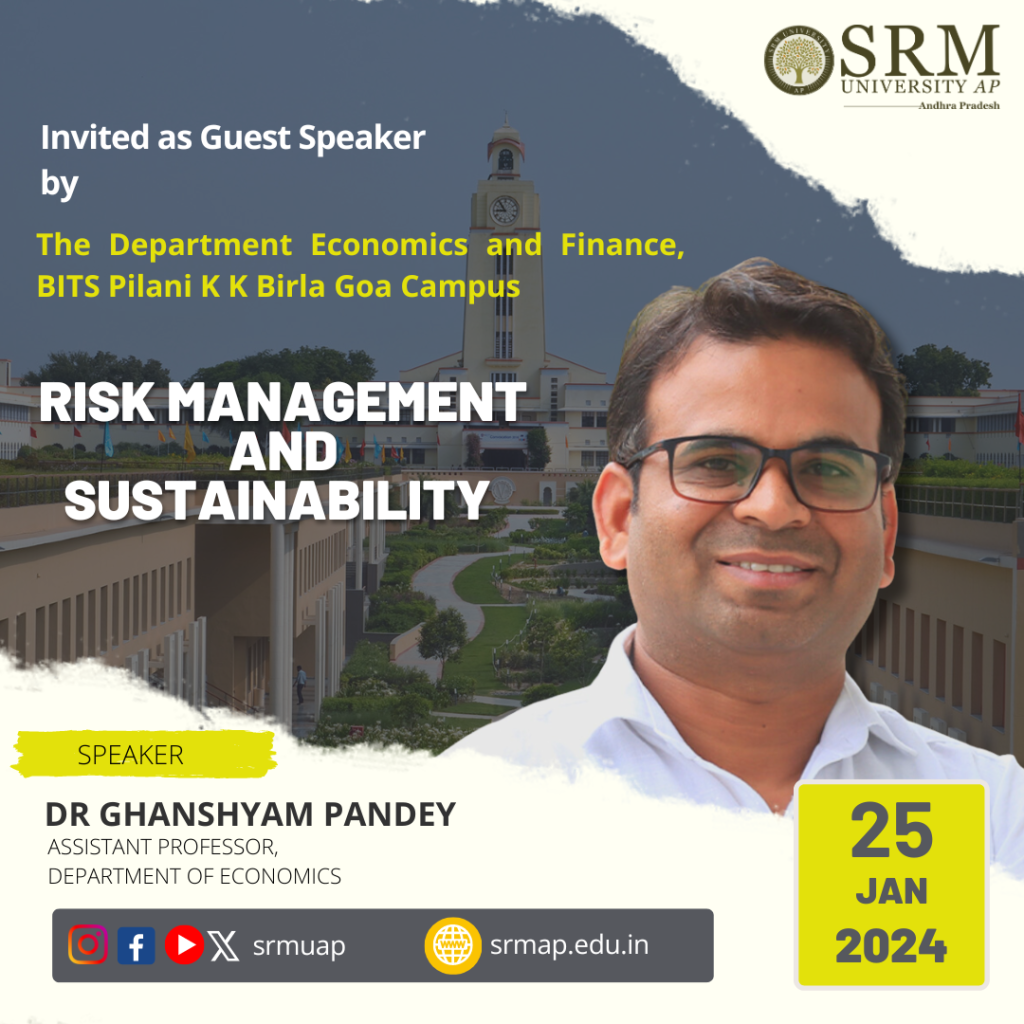
Dr Ghanshyam Pandey, an Assistant Professor at the Department of Economics, has been invited to deliver a talk on Risk Management and Sustainability on January 25, 2024, at the Department of Economics and Finance, BITS Pilani K K Birla Goa Campus.
Dr Pandey is a distinguished member of SRM University-AP’s teaching faculty and an accomplished economist with numerous publications to his credit. He has led several prestigious government-sponsored projects and is the Principal Investigator for the NABARD-sponsored project titled, “Tenancy and Credit: Exploring Facts below the Crust in AP”.
- Published in Departmental News, Economics Faculty, Economics News, News
Dr Aswini Presents a Poster on the International Stage
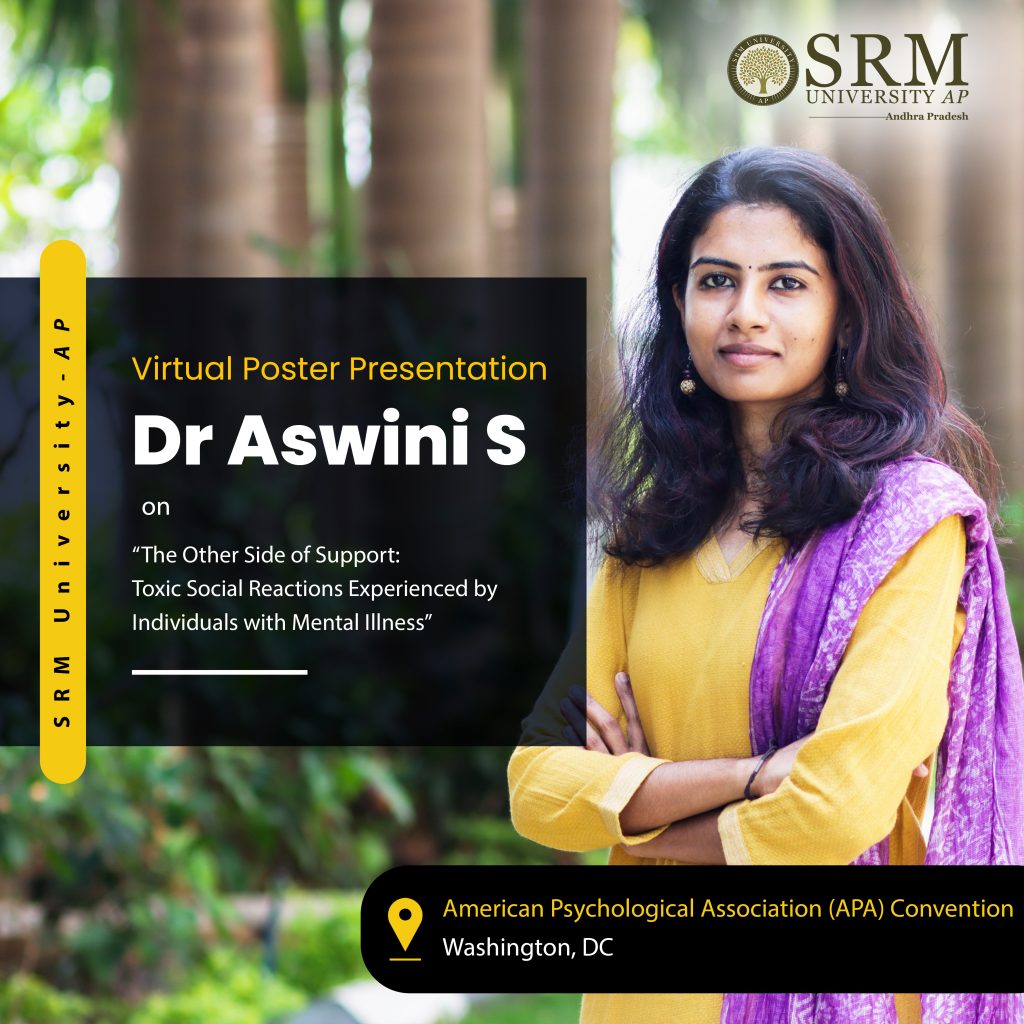 In a proud moment that highlights our institution’s commitment to excellence and innovation, we are thrilled to share the success of a recent poster presentation that graced the global stage.Dr Aswini S, Assistant Professor at the Department of Psychology at SRM University-AP recently represented the varsity at the American Psychological Association (APA) Convention in Washington, DC from August 3 – 5, 2023. The occasion was a prestigious Poster Presentation, titled, “The Other Side of Support: Toxic Social Reactions Experienced by Individuals with Mental Illness”
In a proud moment that highlights our institution’s commitment to excellence and innovation, we are thrilled to share the success of a recent poster presentation that graced the global stage.Dr Aswini S, Assistant Professor at the Department of Psychology at SRM University-AP recently represented the varsity at the American Psychological Association (APA) Convention in Washington, DC from August 3 – 5, 2023. The occasion was a prestigious Poster Presentation, titled, “The Other Side of Support: Toxic Social Reactions Experienced by Individuals with Mental Illness”
Abstract
Social support is undeniably an important aspect of everyday life, and it is particularly
important in the context of challenges. The role of social support as a protective factor is well established (Wright et al., 2013) in research, especially in the context of mental illness (Frame, 1981; Teo et al., 2020). While acknowledging the overwhelming evidence on the importance of social support, there is scant literature on the negative experiences of seeking and receiving support. The qualitative investigation revealed the toxic social reactions under the disguise of social support as reported by participants with mental illness (N=17). Participants experienced interactions which sometimes resembled social support but were either harmful or not beneficial to them. The frequently reported reactions of participants are trivialising of symptoms, toxic positivity, and fake sympathy. In comparison to physical illness, the indicators of mental illness are less objectively perceptible to others. Hence, the practice of dismissing symptoms and attributing disorders as momentary feelings, or imaginary experiences are found to be common. Moreover, the suggestion to be positive and reject anything that may trigger negative emotions along with the display of fake sympathy by people around is also found in participant narratives. This signifies the importance of studying social support through different dimensions rather than just focusing only on support that is helpful and beneficial. Future explorations can focus on understanding specific sources of support, kinds of support and the impact that such challenges have on the quality of relationships with significant others.
Keywords: Toxic positivity, mental illness, social support
The remarkable achievement underscores not only the quality of education we provide but also the dedication of our faculty in making impactful contributions to their fields.
- Published in Assistant Professor, News, Psychology, Psychology Faculty, Psychology News
Dr. Jatis Kumar Dash
- Published in Assistant Professor, Faculty, Physics Faculty, SEAS
Dr Gangi Reddy Salla
- Published in Assistant Professor, Faculty, Physics Faculty, SEAS
Dr Pranab Mandal
- Published in Assistant Professor, Faculty, Physics Faculty, SEAS


